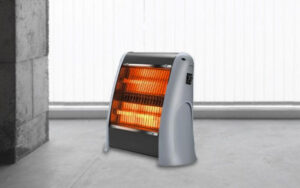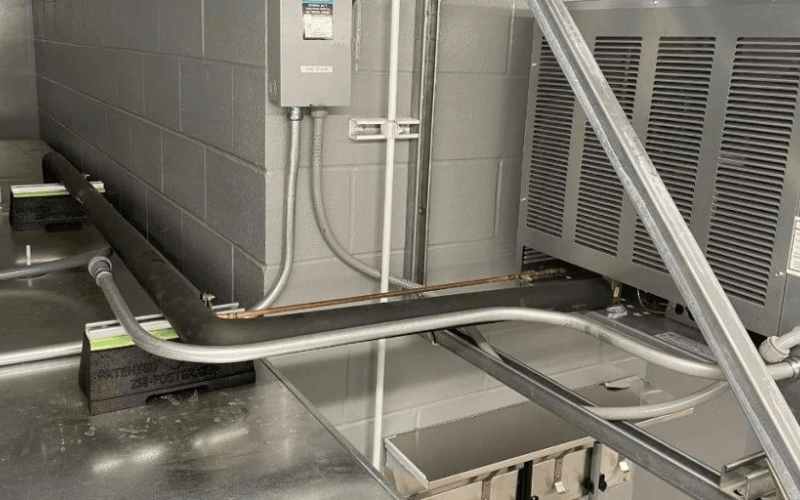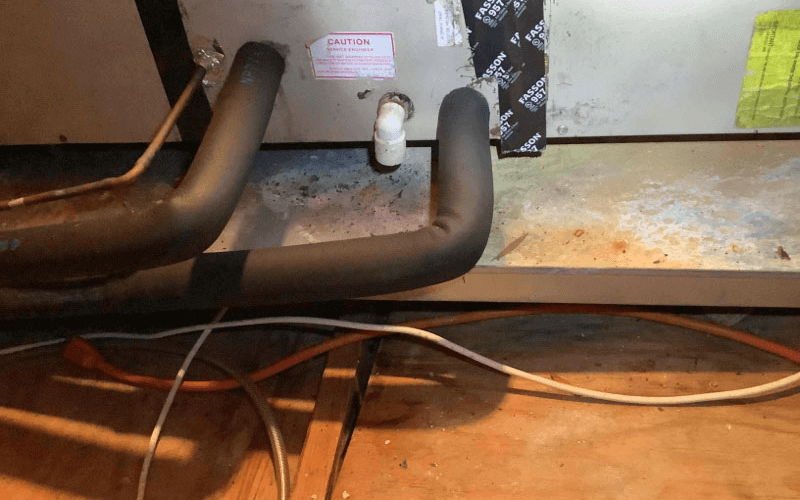Natural gas water heaters are equipment that heat water with natural gas. These heaters are commonly used in homes to provide hot water for showers, dishes, and laundry. While natural gas water heaters are an efficient and cost-effective way of heating water, there are legitimate worries about the safety of the exhaust from these heaters.
Table of Contents
ToggleIs gas water heater exhaust Dangerous? Water heaters emit a large amount of hot exhaust gases. The problem is that if an exhaust vent slopes downward, toxic carbon monoxide can escape and cause death. Carbon monoxide is the principal gas in all of these exhaust gases. Carbon monoxide is a colorless, odorless gas that, if inhaled, can be fatal. Let’s review how an exhaust might be hazardous to your health if not properly ventilated.
Does A Water Heater Exhaust Give Off Carbon Monoxide?
Yes, carbon monoxide can be produced by a water heater exhaust. If the appliance malfunctions, it may not function properly and leak gas into the residence. Carbon monoxide is a colorless, odorless gas that is extremely dangerous.
Headaches, dizziness, weakness, stomach trouble, vomiting, and chest pain are some symptoms of carbon monoxide poisoning. Long-term consequences of such exposure could include irreparable brain damage, heart problems, and death. There are various possible causes of a carbon monoxide leak when a water heater malfunctions. The installation process is one of these mistakes. A water heater might potentially fail as a result of insufficient maintenance. If you have a water heater, ensure it works properly by examining it and teaching you how to use it appropriately.
Also, Read: Will A Gas Water Heater Work Without Electricity?
The Risks Associated with Gas Water Heater Exhaust.
Carbon Monoxide Poisoning.
Carbon monoxide is a toxic gas that, at high doses, can be fatal. If not properly vented or maintained, gas water heaters can emit high levels of carbon monoxide. Prolonged exposure to this gas can cause headaches, dizziness, nausea, and, in extreme situations, death.
Fire Hazard.
A poorly ventilated gas water heater might cause a fire. Gas buildup caused by insufficient ventilation or leakage in the exhaust system can lead to explosions or fires.
Health Issues.
In addition to carbon monoxide, other hazardous gases such as nitrogen dioxide and sulfur dioxide may be present in the exhaust of a gas water heater. Exposure to these gases might induce respiratory problems or aggravate pre-existing respiratory diseases.
Also, Read: How Long To Hold Pilot Light on Gas Water Heater?
Tankless Water Heater Carbon Monoxide.
You may be wondering if your tankless water heater is safe. After all, tankless water heaters heat water with gas, which might be hazardous. The good news is that tankless water heaters are completely risk-free. They are far more secure than standard water heaters. Tankless water heaters do not produce carbon monoxide. Carbon monoxide is a colorless, odorless gas that is extremely dangerous. When traditional water heaters use gas to heat water, carbon monoxide is produced. In contrast, tankless water heaters do not need gas. They employ a different heating mechanism that does not emit carbon monoxide. So, a tankless water heater is a terrific alternative if you’re seeking a safe and effective way to heat water.
Does Carbon Monoxide Rise?
Carbon monoxide can easily pass through drywall due to its incredibly small molecules. Carbon monoxide exists in extremely low amounts in the Earth’s atmosphere. It is highly combustible and harmful to humans and other oxygen species. Carbon monoxide is created at a rate ranging from two to five gigatonnes per year by human and natural sources.
When anything burns due to a lack of oxygen or an excess of carbon, carbon monoxide (CO) is created instead of carbon dioxide (CO2). In enclosed rooms, water heaters and insufficiently ventilated stoves can produce dangerously high carbon dioxide levels. Carbon monoxide, by its effect on the troposphere, also indirectly contributes to building greenhouse gases in the atmosphere.
Ensuring Safety and Mitigating Risks.
Regular Maintenance.
To reduce the risks connected with gas water heater exhaust, a competent specialist must repair and maintain the heater regularly. This ensures that the device works properly and that the Venting System is Free Of Blockages.
Proper Ventilation.
Proper ventilation is essential for preventing the development of hazardous gases. The venting system should be properly sized and installed according to the manufacturer’s instructions.
Detectors of Carbon Monoxide.
Installing carbon monoxide detectors in your home, particularly near bedrooms, is a great safety precaution. These detectors can warn you of dangerous levels of carbon monoxide, allowing you to take immediate action.
Professional Installation.
Hire a certified professional to install your gas water heater to guarantee it satisfies all safety regulations and local building codes.
Conclusion.
Finally, supplying hot water to your home is simple because of gas water heaters. Understanding the possible hazards associated with these emissions, such as fire and carbon monoxide poisoning. You can safeguard your family and home first and disconnect appropriate heat from the gas water heater by taking safety procedures to keep your home in good repair and routinely maintained, as well as ensuring the gas water heater is fitted and properly ventilated. Be careful and observant to stay safe.
FAQ
Are water heaters a source of carbon monoxide?
Carbon monoxide can leak from improperly vented or maintained gas boilers. Carbon monoxide can build up within the house if the vents are clogged or broken. To ensure proper operation, a qualified specialist should inspect and service gas-fired boilers regularly.
Is a gas water heater needed to have an exhaust system?
Your water heater must properly discharge exhaust gas while drawing in new air. Because exhaust gas contains carbon dioxide, it must be cleaned.
Is the gas smell coming from the water heater hazardous?
If you smell gas near your water heater, you must act promptly. Carbon monoxide poisoning or a fire might result from a little gas leak.
Is it possible to become ill from water heater gas?
Carbon monoxide from a faulty gas heater may cause health problems that worsen or occur just when the heating is turned on. Carbon monoxide is colorless and odorless. Carbon monoxide levels in the air are exceedingly dangerous, causing people to faint or possibly die.





















